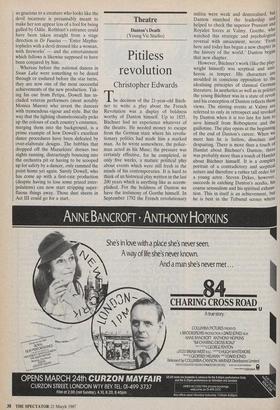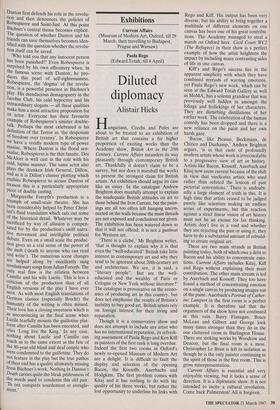Theatre
Danton's Death (Young Vic Studio)
Pitiless revolution
Christopher Edwards
The decision of the 21-year-old Buch- ner to write a play about the French Revolution was a display of boldness worthy of Danton himself. Up to 1835, Blichner had no experience whatever of the theatre. He needed money to escape from the German state where his revolu- tionary politics had made him a marked man. As he wrote somewhere, the police- man acted as his Muse; the pressure was certainly effective, for he completed, in only five weeks, a mature political play about events which were still fresh in the minds of his contemporaries. It is hard to think of an historical play written in the last 200 years which is anything like as accom- plished. For the boldness of Danton we have the testimony of Goethe himself. In September 1792 the French revolutionary militia were weak and demoralised, but Danton snatched the leadership and helped to check the superior Prussian and Royalist forces at Valmy. Goethe, who watched this strategic and psychological reversal with amazement, wrote: 'Rola, here and today has begun a new chapter in the history of the world.' Danton began that new chapter. However, Biichner's work (like the play- wright himself) was sceptical and anti- heroic in temper. His characters are moulded in conscious opposition to the idealising principles of classical German literature. In aesthetics as well as in politics the young Buchner was in a state of revolt and his conception of Danton reflects these views. The stirring events at Valmy are referred to only in retrospect and invoked by Danton when it is too late for him to save himself from Robespierre and the guillotine. The play opens at the beginning of the end of Danton's career. When we meet him he is listless, dissolute and despairing. There is more than a touch of Hamlet about Bilichner's Danton; there was probably more than a touch of Hamlet about Buchner himself. It is a complex portrait of a contradictory and sceptical nature and therefore a rather tall order for a young actor. Steven Dykes, however, succeeds in catching Danton's acedia, his coarse sensualism and his spiritual exhaus- tion. This in itself is an achievement, but he is best in the Tribunal scenes where Danton first defends his role in the revolu- tion and then denounces the policies of Robespierre and Saint-Just. At this point Buchner's central theme becomes explicit. The question of whether Danton and his friends can save themselves becomes iden- tified with the question whether the revolu- tion itself can be saved.
Who told you that any innocent person has been punished?' Even Robespierre is surprised by his own effrontery when, in the famous scene with Danton, he pro- duces this pearl of self-righteousness. Robespierre, the 'dogma' of the revolu- tion, is a powerful presence in Buchner's play. His mendacious demagoguery in the Jacobin Club, his cold hypocrisy and his extraordinary slogans — all these qualities make him a most attractive proposition for an actor. Everyone has their favourite example of Robespierre's sinister double- talk. Perhaps the most celebrated is his definition of the Terror as 'the despotism of freedom over tyranny'. In Robespierre we have a vividly modern type of power maniac. Where Danton is the florid sen- sualist, Robespierre is the thin fanatic. Des McAleer is well cast in the role with his cold, lupine manner. The same actor also Plays the drunken Irish General, Dillon, and as it is Dillon's clumsy plotting which enables Robespierre to accuse Danton of treason this is a particularly appropriate piece of double casting. .Margarethe Forsyth's production is a triumph of small-scale theatre. She has been considerably helped by Peter Christ- ian's fluid translation which cuts out some of the historical detail. Whatever may be sacrificed by way of allusion is compen- sated for by the production's swift narra- tive movement and intelligible political debate. Even on a small scale the produc- tion gives us a real sense of the power of the mob (`cleath to anyone who can read and write'). The numerous scene changes are helped along by excellently sung revolutionary songs from Julian Forsyth. The only real flaw is the relation between Camille and his wife Lucile. This is less a Criticism of the production than of all English versions of the play I have ever seen. As with most English translations of German classics (especially Brecht) the humanity of the writing is often missed. Their love has a cloying sweetness which is as unconvincing as the final scene when Lucile tearfully mounts the guillotine plat- form after Camille has been executed, and Cries 'Long live the King.' In any case, nothing about Lucile and Camille can touch us to the same extent as the fate of the 80-year-old blind and deaf couple who were condemned to the guillotine. They do not feature in the play but the true pathos of their end has a quality ultimately missing from Biichner's work. Nothing in Danton's Death carries quite the bleak pitilessness of the words used to condemn this old pair: `Ils ont conspires sourdement et aveugle- ment.'



















































 Previous page
Previous page